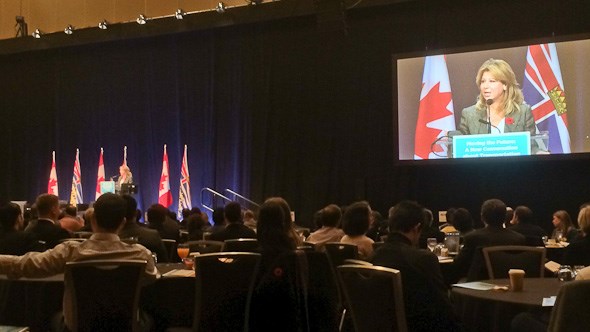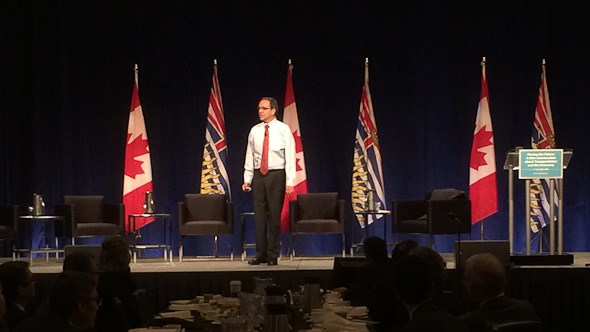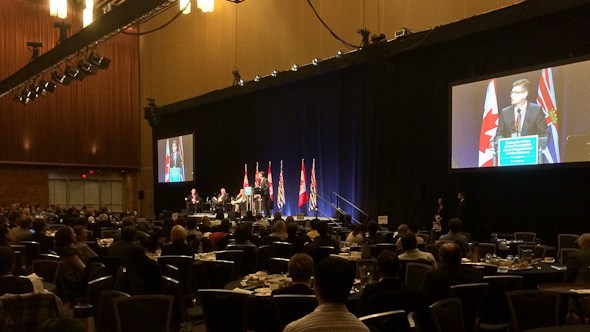1.4 Million. That’s the number of new residents who will call Metro Vancouver, Squamish, and the Fraser Valley home in 30 years, according to Urban Futures. It might sound like a big number, but it sounds even bigger if you compare it to the 2.8 million people currently here.
What does that mean? It means add another person for every 2 people you see on the sidewalk, the seawall, or the 99 B-Line. Consider going to a few more open houses or replying to a few more Craigslist apartment rental ads to compete with the 30% increase in other responses. Add a couple hours to your wait at the border, or on Hwy1 before the weekend.
It suddenly becomes pretty easy to see the challenge ahead of us as a region.
On Thursday, about 500 representatives from local municipalities and universities; the business community; and planning, development and transportation organizations assembled at Vancouver Convention Centre West for Moving the Future: A New Conversation about Transportation and the Economy. I live-tweeted the conversations and assembled some of the best tweets here.
Phil Baudin: 50,000 people now using car share services in Metro Vancouver. #movingthefuture — Robert W. White (@rbrtwhite) Oct 31, 2013
Presented by Architecture Canada, BC Chamber of Commerce, Business Council of British Columbia, Get On Board BC, Surrey Board of Trade, Sustainable Transportation Coalition, The Vancouver Board of Trade, Tourism Vancouver, TransLink, Unifor Local 111 and Urban Development Institute, the event examined the links between transportation and the economy, and the opportunities and challenges we’ll be facing between now and 2043. Half a million jobs will be added to the economy, along with 3 million rides on transit. What role will transportation play in Metro Vancouver’s economic prosperity today and in the future?

Mayor Gregor Robertson and Mayor Dianne Watts kicked off the morning with a unified message of urgency around providing transportation options throughout the region. This isn’t a time to pay attention to municipal borders, they echoed. Mayor Gregor noted that the 21st century will be driven by cities addressing efficiency and productivity, and emphasized the importance of presenting the costs of adding cars vs. transit for another million people in a way communities would understand.
Mayor Watts noted 70% of the population increase will likely take place South of the Fraser in Delta, Surrey, Langley, and White Rock and acknowledged, “If we don’t deal with congestion - If we make bad decisions, [our children] will reap what we sow.”

'Great cities aren't the ones where the poor own cars, but where the rich take public transit' - @Penalosa_G #movingthefuture — Robert W. White (@rbrtwhite) Oct 31, 2013
A range of panelists, moderators, and keynote speakers contributed to the dialogue including Gil Peñalosa, Executive Director of 8-80 Cities (who also spoke at Sam Sullivan's Urban Forum last year), Tom Prendergast, Chairman and CEO of New York MTA (and former Translink CEO), and Art Leahy, CEO of LA Metro.
Art Leahy: "The greatest risk is underinvestment." Raises example/issue of Canada Line platform length. #movingthefuture — Robert W. White (@rbrtwhite) Oct 31, 2013
Some themes that surfaced during the rest of the conference included an emphasis on thinking regionally (you already know I'm a big fan of a regional perspective), asking how to fund improvements, communicating what the upcoming referendum on transit really means, and examining just how closely the economy and transportation are linked.
What did I take away? The importance of bringing all the players together - the idea people, the message people, the people who can actually get things done, and the people who can help pay for it. We have an idea of where we want to be in 30 years, we know there are plenty of ways to get the community involved to convey that message, we just need to figure out how to grab the attention of those who are able to find the money and make it happen to make sure conversations like these don't end here.
McGarrigle: “What happens if the transit referendum fails? Where will the economy be in 10yrs? Will new biz locate here?” #movingthefuture — Robert W. White (@rbrtwhite) Oct 31, 2013

To continue the conversation and to take a look at videos and presentation slides from the event as they're uploaded, visit www.movingthefuture.ca or browse through the tweets from the conference at #movingthefuture.
Let's make sure 'Metro Bottom-Corner-Of-Mainland-BC' gets the transit it needs!



